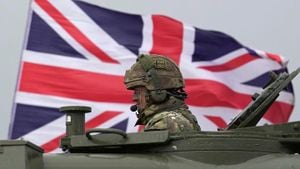The European Union is set to announce one of its largest military aid packages for Ukraine, amounting to at least 6 billion euros, as part of its efforts to bolster the nation's position amid the protracted conflict with Russia. This substantial support package, anticipated to be revealed on February 24—the third anniversary of Russia's initial invasion—aims to supply Ukraine with needed military resources as it prepares for high-stakes negotiations with both Russia and the United States.
According to reports, this latest round of assistance will include various military supplies, ranging from 1.5 million artillery shells to advanced air defense systems. With the situation on the front lines growing increasingly dire, diplomats within the EU recognize the urgency of enhancing Ukraine's military capabilities to counter the intensifying Russian offensive.
"The new support package will include everything from 1.5 million artillery shells to air defense systems," as noted by Politico. Such provisions are deemed necessary to reinforce Ukraine's defense strategy, enabling it to withstand potential escalations from Russian forces.
While the official announcement is yet to occur, internal discussions among EU member states indicate plans to possibly raise the overall military aid to 10 billion euros. Such deliberations highlight the EU's commitment to ensuring Ukraine is adequately equipped to face immediate challenges, which may prove pivotal as the embattled nation grapples with continuous threats to its sovereignty.
These efforts come against the backdrop of renewed peace negotiations, recently commenced between the United States and Russia. Expectations among diplomats suggest these discussions could pave the way for establishing a sustainable resolution to the conflict, yet the situation remains complex and fluid.
Fox News reported on the outline of the peace negotiations, which involve a three-phase plan. The first step includes ceasefire discussions, followed by the possibility of upcoming presidential elections within Ukraine, and culminating in the signing of a peace accord. This roadmap reflects both parties’ recognition of the urgent need to de-escalate hostilities.
The provision of military support from the EU is not merely about empowering Ukraine; it's also about shaping the broader geopolitical climate. Such actions could serve as a deterrent to future Russian aggression, emphasizing the collective stance of Western nations against perceived threats from Moscow. Analysts point out this military reinforcement can help renew Ukraine's armed forces, indicating the region's strategic importance on the global stage.
The international repercussions of this support package extend beyond the immediate military capabilities of Ukraine. It influences diplomacy among key global powers, with the EU's stance likely to spark discussions about defense postures throughout Europe and beyond. The expectation is for allied nations to rally around Ukraine, fostering unity against external threats.
This situation inevitably raises concerns about economic stability. The conflict has already had substantial ramifications for global markets, impacting everything from energy prices to security policies. The continuation of violence can disrupt trade routes and exacerbate inflation rates worldwide, which economies are still grappling with post-pandemic.
International markets are closely watching these developments. The strategic decisions made by the EU and the outcome of negotiations will not only affect Ukraine's immediate situation but could also reshape future economic landscapes across Europe and beyond. Investment flows could be redirected based on the perceived stability or volatility of the region, influencing growth trajectories.
While the situation remains iterative, the EU's military financing plans reflect both urgency and strategic foresight. This backing may well define the contours of upcoming negotiations and the eventual outcome of the conflict, marking it as one of Europe’s defining geopolitical moments of the 21st century.
On theory’s fringes, the continual military support for Ukraine might also spark debates about military engagements elsewhere and influence defense policies globally. Countries observing this situation(s) may reassess their own postures, leading to potential shifts within international alliances.
The focus now, as Ukraine prepares for its pivotal moment on the diplomatic front, is on the resilience shown by its armed forces. How they maneuver through these tumultuous tides with the EU's support could very well set precedents for future conflict resolutions.
All eyes will be turned to the developments announced on February 24, where the balance of power could shift significantly based on the outcomes of these initiatives. The ramifications of such decisions will resonate beyond just military aid or financial support—altering global economic dynamics, security alliances, and the overarching narrative of conflict and peace on the world stage.



